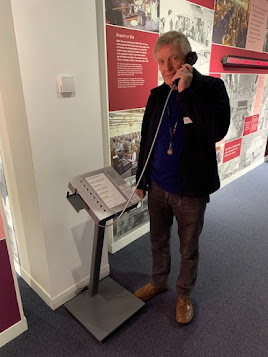Behind the Wheel - Tales from our Volunteers
By Roger Gollicker
With the number of volunteers at the Museum now numbering nearly 100, we thought we’d look at three long term volunteers who have interesting stories to tell.
The first is Colin Corke, almost certainly the longest
serving volunteer, who started in 2002, long before the main volunteer
programme began in 2012. Colin’s story is a fascinating one, as he still works
full time as an Associate Priest for the Church of England in Rubery, having
for many years been the Vicar of Longbridge, in addition to his many years
working in the Museum’s archive department. He loves to explore with the rich
resources of the archive, how the motor industry and cars influenced society.
In his own words as a life-long car enthusiast - he’s a bit of a car nerd - and
has always been deeply involved in the culture of British Leyland.
For instance, he’s chairman of the Allegro Club
International and owns the following: two Metros, three Allegros, one Princess
and two Rover R8 200s. In addition, he helps look after an Austin A35. He’s
also a co-author of the book, Making Cars at Longbridge, which is full of
images depicting the history and culture of that famous factory.
So, who better to work in the archive section, a job where a
detailed knowledge of the past is a huge benefit. His Friday day off
volunteering entails many tasks, particularly as the amount of generous
donations the Museum receives never ceases. A lot of Colin’s time is currently
spent on image sorting and production record traces.
Most, if not all of Colin’s cars, have been to car meets,
exhibitions, shows and museums. Recently, one of his cars won a judged award
he’s been trying to win with his various cars for around 10 years – a trophy at
the annual Hagerty Festival of the Unexceptional – a Concours de L’Ordinaire,
held this year at Grimsthorpe Castle, Lincolnshire. The car in question,
Colin’s immaculate Applejack coloured 1981 mini Metro base with 998cc A series
engine. The photo below shows Colin proudly holding his winning trophy, a
wonderful comic design, featuring a beautifully mounted unexceptional sandwich.
John’s background is however in engines, starting out with Ford as a student apprentice. He then worked at their Dunton, Essex plant as an exhaust emission test engineer, before moving on to their nearby Daventry plant. He progressed through the industry, ending up working for Cosworth Engineering, eventually becoming Sales and Marketing Director Road Engines. This was an era when Cosworth engines could be found in cars like the Sierra, Escort and Scorpio Cosworths.
Like a lot of our volunteers, John is also a classic car owner. He completely rebuilt, except for repainting, his own 1975 MGB roadster, which with a rollover bar fitted and no soft top, looks the business.
John has always been an integral part of the restoration team, and his welding skills were certainly tested when we were given the task of restoring the Museum’s 1960 Standard Ensign. When, somewhat later, the car developed a terminal engine problem, he and a colleague became very much involved with the engine failure diagnosis and rebuild. Now they are currently under the bonnet again, investigating and trying to solve a head gasket problem.
His talents don’t end there though, as he’s also been very much involved with the Museum’s Learning and Engagement Team. For children, he’s built a model car track, which demonstrates the effect of different road surfaces, plus a clever light box, showing how old semaphore signals and flashing indicators used to work. If there’s something they need fixing, repairing or designing, then John’s your man. He also acts as a guide in the Collections Centre.
Our third volunteer is Cameron Slater, who has been a
volunteer for almost nine years now. Cameron’s working life included teaching
English in Glasgow, Programme Planning at Scottish Television and Central
Television and a Communications Consultancy teaching business English to
speakers of other languages.
But what’s his connection with cars? Well, from his first
car in 1965 (a 1954 split screen Morris Minor) he has always owned a classic. A
Riley RME replaced the Morris, and the list includes an Alvis TD21, an AC Greyhound, a Lancia Fulvia Zagato and several
others. Cameron’s current money pit (his words!) is a 1980 Lancia Beta Spyder.
So, a lifetime spent with cars was an easy choice to
volunteer at the Museum. He began as a guide in the newly opened Collections
Centre and always enjoys talking to visitors about our cars and listening to
their stories of their motoring experiences.
Cameron has also contributed to the research, writing and
presentation of several History Talks
including The Most Beautiful Car in the World – the Jaguar E-type. Emma, who
heads up the Learning and engagement Team, had a request for a presentation of
this talk from the Berrima District Historic Vehicle Club. So, where’s Berrima?
Well, it’s in New South Wales and there was rumour of a trip to Australia. But
no, the talk was to be delivered by two-way video link and would form one of
the Club’s regular meetings. Cameron volunteered for international duty and the
photo below shows him being filmed in action, presenting the talk.









